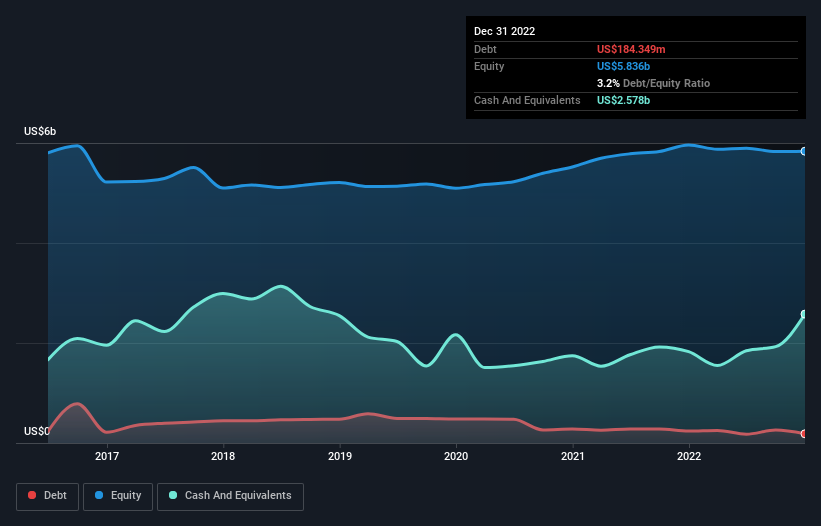- United States
- /
- Semiconductors
- /
- NasdaqGS:FSLR
Does First Solar (NASDAQ:FSLR) Have A Healthy Balance Sheet?

Howard Marks put it nicely when he said that, rather than worrying about share price volatility, 'The possibility of permanent loss is the risk I worry about... and every practical investor I know worries about.' When we think about how risky a company is, we always like to look at its use of debt, since debt overload can lead to ruin. We note that First Solar, Inc. (NASDAQ:FSLR) does have debt on its balance sheet. But the real question is whether this debt is making the company risky.
What Risk Does Debt Bring?
Debt and other liabilities become risky for a business when it cannot easily fulfill those obligations, either with free cash flow or by raising capital at an attractive price. Ultimately, if the company can't fulfill its legal obligations to repay debt, shareholders could walk away with nothing. However, a more frequent (but still costly) occurrence is where a company must issue shares at bargain-basement prices, permanently diluting shareholders, just to shore up its balance sheet. Of course, the upside of debt is that it often represents cheap capital, especially when it replaces dilution in a company with the ability to reinvest at high rates of return. The first thing to do when considering how much debt a business uses is to look at its cash and debt together.
View our latest analysis for First Solar
What Is First Solar's Net Debt?
You can click the graphic below for the historical numbers, but it shows that First Solar had US$184.3m of debt in December 2022, down from US$239.9m, one year before. However, it does have US$2.58b in cash offsetting this, leading to net cash of US$2.39b.

How Healthy Is First Solar's Balance Sheet?
The latest balance sheet data shows that First Solar had liabilities of US$1.04b due within a year, and liabilities of US$1.38b falling due after that. On the other hand, it had cash of US$2.58b and US$355.0m worth of receivables due within a year. So it can boast US$517.8m more liquid assets than total liabilities.
This surplus suggests that First Solar has a conservative balance sheet, and could probably eliminate its debt without much difficulty. Simply put, the fact that First Solar has more cash than debt is arguably a good indication that it can manage its debt safely. The balance sheet is clearly the area to focus on when you are analysing debt. But it is future earnings, more than anything, that will determine First Solar's ability to maintain a healthy balance sheet going forward. So if you're focused on the future you can check out this free report showing analyst profit forecasts.
Over 12 months, First Solar made a loss at the EBIT level, and saw its revenue drop to US$2.6b, which is a fall of 10%. That's not what we would hope to see.
So How Risky Is First Solar?
Statistically speaking companies that lose money are riskier than those that make money. And we do note that First Solar had an earnings before interest and tax (EBIT) loss, over the last year. Indeed, in that time it burnt through US$30m of cash and made a loss of US$44m. Given it only has net cash of US$2.39b, the company may need to raise more capital if it doesn't reach break-even soon. Overall, its balance sheet doesn't seem overly risky, at the moment, but we're always cautious until we see the positive free cash flow. The balance sheet is clearly the area to focus on when you are analysing debt. However, not all investment risk resides within the balance sheet - far from it. Case in point: We've spotted 1 warning sign for First Solar you should be aware of.
Of course, if you're the type of investor who prefers buying stocks without the burden of debt, then don't hesitate to discover our exclusive list of net cash growth stocks, today.
New: AI Stock Screener & Alerts
Our new AI Stock Screener scans the market every day to uncover opportunities.
• Dividend Powerhouses (3%+ Yield)
• Undervalued Small Caps with Insider Buying
• High growth Tech and AI Companies
Or build your own from over 50 metrics.
Have feedback on this article? Concerned about the content? Get in touch with us directly. Alternatively, email editorial-team (at) simplywallst.com.
This article by Simply Wall St is general in nature. We provide commentary based on historical data and analyst forecasts only using an unbiased methodology and our articles are not intended to be financial advice. It does not constitute a recommendation to buy or sell any stock, and does not take account of your objectives, or your financial situation. We aim to bring you long-term focused analysis driven by fundamental data. Note that our analysis may not factor in the latest price-sensitive company announcements or qualitative material. Simply Wall St has no position in any stocks mentioned.
About NasdaqGS:FSLR
First Solar
A solar technology company, provides photovoltaic (PV) solar energy solutions in the United States, France, Japan, Chile, and internationally.
Very undervalued with flawless balance sheet.


